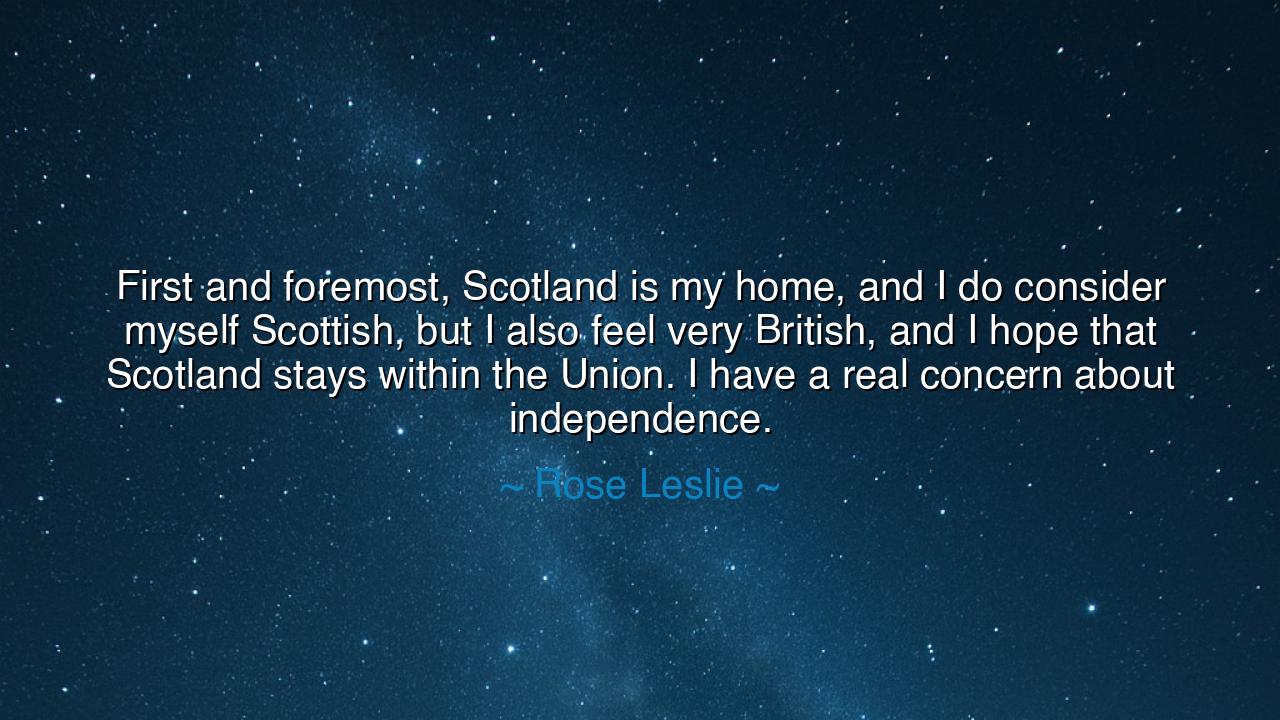
First and foremost, Scotland is my home, and I do consider myself
First and foremost, Scotland is my home, and I do consider myself Scottish, but I also feel very British, and I hope that Scotland stays within the Union. I have a real concern about independence.






"First and foremost, Scotland is my home, and I do consider myself Scottish, but I also feel very British, and I hope that Scotland stays within the Union. I have a real concern about independence." – Rose Leslie
Hear these words, O children of the Isles, for they echo the tender conflict of a heart divided not by hate but by love — love of Scotland, her rugged hills and quiet glens, and love of the Union, that great tapestry woven of many peoples and histories. When Rose Leslie, daughter of Scotland and voice of grace and truth, spoke these words, she gave form to an ancient struggle that lives in every human soul: the struggle between belonging and separation, between the call of one’s own hearth and the bond that ties one to the greater whole.
In her confession, she honors the dual identity that has shaped her — Scottish by blood and heart, yet British by heritage and shared destiny. She does not deny her homeland’s pride; she celebrates it. Yet she also fears that independence, though noble in spirit, may bring sorrow if sought without foresight or unity. Her concern is not born of disloyalty, but of wisdom: that sometimes the strength of a people lies not in breaking apart, but in standing together through the storms of time. For even the proudest mountain draws its life from the rivers that flow beyond its bounds.
History too bears witness to this truth. Recall the story of the Roman Republic, which once flourished through unity and shared purpose. But when its provinces and allies began to value division over fellowship, when identity hardened into isolation, the republic fractured — and the glory of Rome gave way to empire, and then to ruin. The lesson endures: independence without harmony may bring not renewal, but fragmentation. It is not enough to seek freedom; one must also ask, “What will we build once we are free?”
Yet Rose Leslie’s words are not a denial of national pride; they are a plea for balance. She reminds us that identity is not a sword to divide, but a bridge to connect. One can be wholly Scottish and still deeply British, just as one can love one’s village and one’s nation without contradiction. True identity is vast, not narrow; it embraces, not excludes. The wise understand that to cherish one’s own does not mean to reject the other — for the truest love of country is not blind passion, but thoughtful devotion.
Her “real concern about independence” springs from love, not fear. For she sees what many forget: that the ties between peoples are not merely political, but human — shared memories, sacrifices, and songs. To tear them apart is not an act to be done lightly. Independence may promise power, but unity preserves peace; and sometimes, peace is the higher freedom. Her words call not for submission, but for reflection — a pause before the sword is drawn, a breath before the bridge is burned.
Let this be a lesson for all nations and all hearts: do not mistake separation for strength, nor unity for weakness. The tree that grows alone in the field must bear the full force of the wind; but the forest, bound by its roots, weathers the storm together. Whether in the affairs of countries or the bonds between people, wisdom lies in finding the harmony between selfhood and solidarity.
So, to all who dwell between loyalties and loves, take heed of Rose Leslie’s gentle wisdom: honor where you come from, but also the bonds that sustain you. Love your homeland fiercely, but not so fiercely that you forget the greater family of which it is a part. For identity, like freedom, is richest when shared — and the heart that holds both pride and compassion will always belong to the noblest kind of patriot: one who seeks not only to be free, but to be whole.






AAdministratorAdministrator
Welcome, honored guests. Please leave a comment, we will respond soon